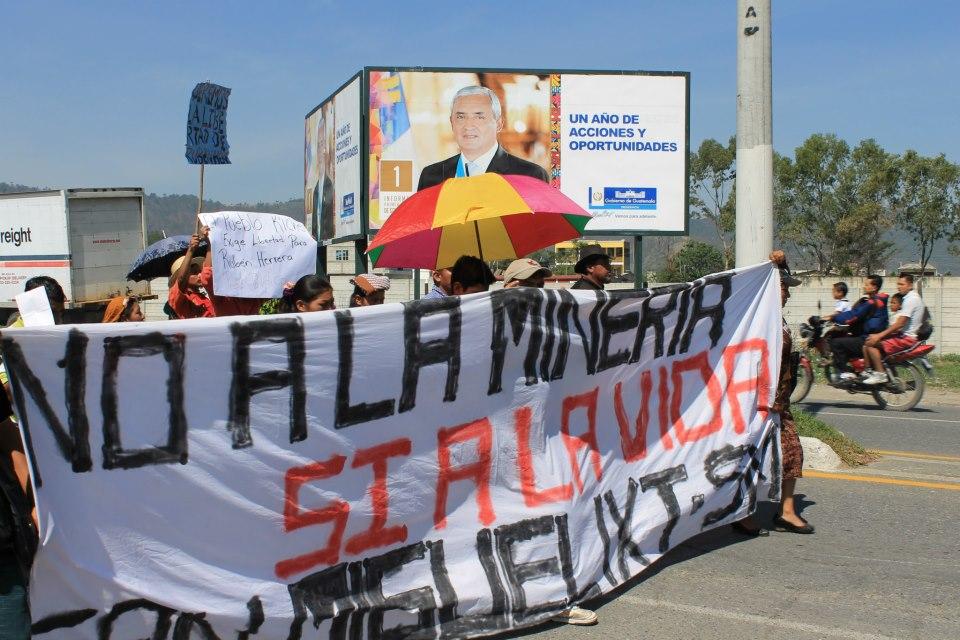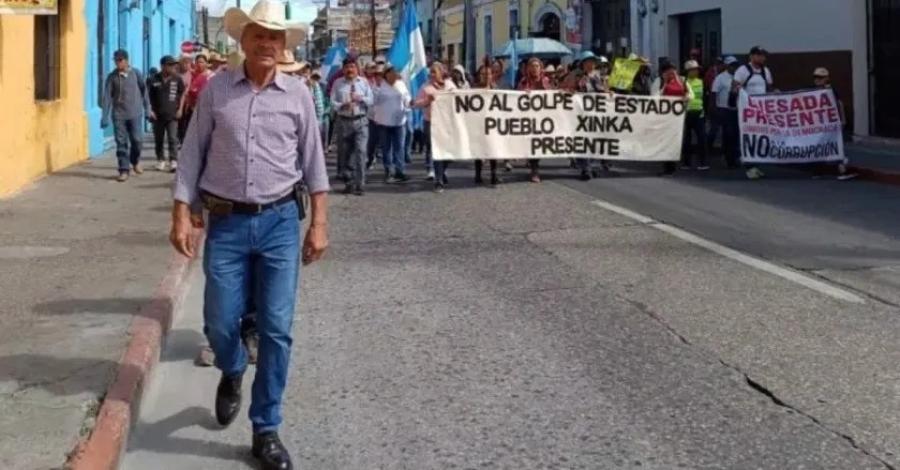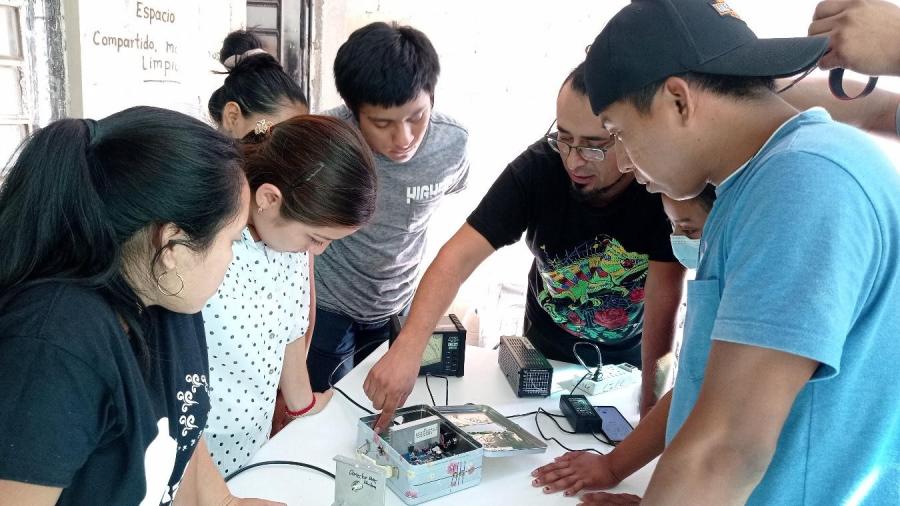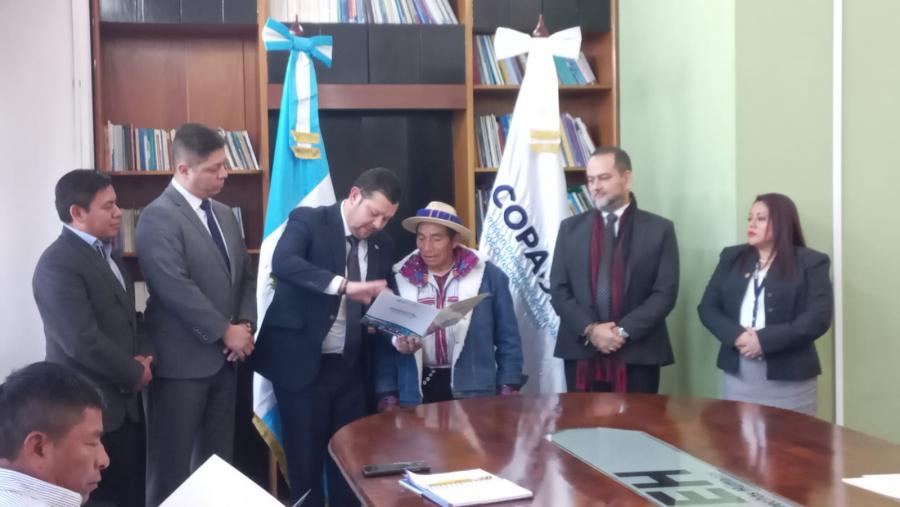
In order to resolve the conflict generated by the installation of the Spanish company Hidro Santa Cruz’s Cambalam I Hydroelectric Project in Santa Cruz Barillas, Guatemala, the organized civil society, groups related to the company, and government representatives intend to hold dialogues mediated by Catholic Bishop Álvaro Ramazzinni, a long-time supporter of communities’ rights in conflicts with foreign companies and the government.
Prensa Comunitaria interviewed Monsignor Álvaro Ramazinni. The following are highlights from his interview.
Prensa Comunitaria: How would you describe the situation that is going on in Barillas, based on your previous experience in similar conflicts in Guatemala?
AR: Since the beginning, the people were not well informed. Secondly, as always, the business practice is for a company to arrive and start its project saying “we already have legal permission from the central government,” without taking into account that there is a lot of sensitivity in the communities about such projects because they want to know what will be the real benefits for them.
The electric energy problem has not been resolved either, neither the rates nor the electricity law, which has not changed; there is no application of the Convention 169 of the International Labor Organization. All of this makes the situation more difficult, because a company comes and starts to do everything without providing prior information to the communities. The central government neither informs nor points out the real benefits for the town; the companies do not state the amount neither of their investments nor of their profits, and all of this creates a bad atmosphere. Additionally, there lacks a constant presence of the authorities. The matter gets really complicated because we are in a country where many people do not know the law or even how to comply with it. We don’t have a functional rule of law, nor do we have State presence in the far reaching corners of the country.
If foreign investments require no policy of informing, then a lot of confusion is created. In these cases the companies arrive with legal backing for their projects, having gained permission from the State, and begin to act. This cannot be.
The deputy minister from the Ministry of Energy and Mines pointed out that they are looking for transparency, information, and the benefits for the poorest communities. They want to make the investors conscience of the fact that their projects can no just mean coming in to do business and making a profit however they please –which is exactly the mentality of some businesses.
Prensa Comunitaria: The civil society in Barillas has been saying for a while now that the only solution is that the company leaves, because, as you said, they arrived without respecting [the right to consultation] and later engaged in intimidation, human rights violations, and are responsible for the death of Mr. Andres Fransisco Miguel. So the community has come to a point in which they say, if the company does not leave, there will be no resolution. What do you say on this regard?
AR: The issue of legality is at the center of the problem. I asked the deputy minister if legally one can rescind a contract of this nature, made between the Guatemalan government and a company. She responded that if there is no legal foundation, it is hard to break it, so one would have to start with job verification. For example, the subject of who is responsible for the assassination of community leader Andres Fransisco Miguel is not resolved. The judge said that he was not killed because he did not want to sell, given that he did not have land, and that one must wait for the verdict. The most important thing is to reach an agreement between those who do not want the project and those who say they do want it in order to have harmony and peace. There should be a very direct mediation of municipal authorities, because they are the ones who represent the municipality and should be searching for its wellbeing.
Another advantage of today’s dialogue was that it cleared up misunderstandings between the COCODEs, the local citizens, and the civil society. The representatives of COCODEs clearly stated that they did not have any agreement with the company. There will be a press conference to clear up the matter. Additionally, they arrived at a consensus to ask that the National Police return in order to take care of the town and not the interests of the company.
The governor took the role of listening and moderating. Then he said he would put himself in charge of forwarding the community’s petition to the President of the Republic asking for security and peace and requesting that they make the relevant decisions. He asked the deputy minister to use his good offices to convince the mayor to intervene in the solution of this problem.
There is a problem, however, which is a lack of responsibility on the part of the mayor’s office. They did not have a single representative present.
Between December 2012 and January 2013 there was a series of meetings between the civil society and the town mayor’s office, in which the civil society supported the municipality because in this moment it seemed that the mayor was ready to support them in their petition, but there was a moment when the mayor said: “I cannot continue supporting you because the central government pressures me to say yes to the company.” These details do not appear to be certain and I do not want to make a judgment, but there is a municipal code that should be implemented and the municipality should adjust to its own rules in order to meet the responsibilities for which they were elected.
Prensa Comunitaria: Where is this negation headed?
AR: In the future, it will be very important that the ministry informs the communities about the projects that they can do, and that the communities are publicly aware of the amount of investments, profits, and their benefits. It must start with the City Council and the mayor, in a very direct communication with the population represented by the COCODEs and the Civil Society, and also with the representatives of the companies.
Prensa Comunitaria: Has the company tried to intervene in the negotiations?
The company has not intervened at all in the discussions. I did have a personal encounter with the owner of the company, but it was an interview that he asked of me and, since I always listen to everyone, I accepted. It is better that the company has a direct relationship with the government because the contract was made with him.
Not so much the companies, but rather the State of Guatemala is the one who has to take its role as regulator, and before making decisions or signing contracts, the communities’ situations have to sound very good. If not, the same mistakes will be repeated.
Prensa Comunitaria:
What’s the solution here, if the company won’t leave and the community won’t give up fighting until they are gone?
AR: The only solution is dialogue and a negotiation where the members of the community really feel taken into account. The perception that they often have is that they are not heard, that the company simply comes and says: “we already have a license and permission, and we are already going to start constructing”. This method can no longer continue.
Prensa Comunitaria: How did you get involved as a mediator?
AR: Last year, when I had just come here, some people approached me to tell me that they had arrest warrants and asked me what I could do for them. So I made a contract, together with the public prosecution’s lawyer, in order to resolve the problem. This is how I gradually got involved.
My role has been to try to approach individuals so they can hear each other and find solutions. I am new to this department and I do not know much of the history, but I try to inform myself and listen to all of the versions I hear. For this reason, I continue to convince myself that it is my job to find points of convergence.
Prensa Comunitaria: In meetings and dialogues like today’s, the civil society said that they had been informed that a meeting would take place in the town center, but that at the last minute they learned it had been moved to the capital of the department and would take place with people who are not representative of us. How can we be sure that the negotiations are taking place with true representatives of the communities?
In Barillas, the division between the community members equally divides the population. A good communication between the COCODEs and the representatives of the civil society does not exist. One has to ask what happened, since the same COCODEs said they were fearful of the others because of previous incidents of violence. The others say it is not so, and as a result one cannot intervene because he was not present to know who is telling the truth. That is the very difficult point.
Now, the Ministry of Energy and Mines will begin fieldwork with the communities in order to hear their opinions. I hope that those who participate in the meeting maintain dialogue in their own municipalities.



